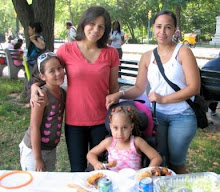Tuesday, November 29, 2011
Learning to Use the Internet as an Advocacy Tool
On Thursday November 17, 2011 the Metropolitan Parent Center (MPC) conducted a workshop entitled, “Internet 101: Learning to Use the World Wide Web. Presenter Mike Mitchell, Deputy Executive Director of Sinergia with the assistance of Godfrey Rivera, Co-Director of the MPC, taught parents the fundamentals of working with the Internet and how to use it as an advocacy tool. They also learned how it can be used to get informed about issues such as how their children’s disabilities affect their learning in school.
Participants also learned about e-mail communication, and how to search topics by using “web browsers.” Parents were given hands-on opportunities to practice using a number of laptops that were set up for their use. They followed instructions by viewing on a large screen while Mr. Mitchell provided easy-to-understand instructions on how to navigate the Internet. The workshop was also available to the Spanish-speaking parents via the use of simultaneous interpretation. In addition, a list of disability-related Internet resources was provided to them, which you can find below.
Disability-Specific Sites
1. http://www.add.org/
This site provides information, resources and networking opportunities to help adults with Attention Deficit/Hyperactivity Disorder (ADHD) by bringing together science and the human experience for both adults with ADHD and professionals who serve them.
2. http://www.autismconcepts.com/
This site shares information from a variety of sources and provides many links to other sites regarding practical ways to help, plan and manage the lives of children with autism. Information with respect to any treatment, therapy, program, service or provider herein is intended for information and educational purposes only.
3. http://www.autism.org/
The Center for the Study of Autism provides information about autism to parents and professionals, and conducts research on the efficacy of various therapeutic interventions for children with autism.
Behavior
4. Behavior Disorders
http://www.behaviordisorder.org/
This website for teens, adults and parents offers information on behavior disorders, conduct disorders, and other behavior problems. Their articles are written to educate the general public about behavior disorders, the warning signs, treatment, and statistics on behavior issues.
5. Behavioral Disorders in Early Childhood
http://www.brighttots.com/Behavioral_disorders.html
This website discusses factors such as the environmental and genetic influences that may contribute to challenging behaviors in young children. There is also information on treatments and interventions for children with behavioral disorders.
6. Center on the Social and Emotional Foundations for Early Learning
http://csefel.vanderbilt.edu/about.html
The Center on the Social and Emotional Foundations for Early Learning is project designed to strengthen the capacity of Head Start and child care programs to improve the social and emotional outcomes of young children.
7. Conduct Disorders-Support for Parents
http://www.conductdisorders.com/
This is a website written by parents who are raising children with many different diagnoses regarding conduct disorders, and who demonstrate oppositional behaviors and are resistant to parenting.
Learning Disabilities
8. www.chadd.org
Children and Adults with Attention Deficit Disorders (CAADD.) This organization advocates for students with ADHD and coexisting disorders.
9. www.interdys.org
The International Dyslexia Association is the oldest of the organizations that are specifically concerned with learning disabilities. Both a medical and an educational emphasis are maintained in this organization
10. Learning Disability Resources
http://www.as.wvu.edu/~scidis/ldinfo.html
This website is a directory with links to other websites with information and resources pertaining to learning disabilities.
11. National Center on Learning Disabilities
http://www.ncld.org/
The National Center for Learning Disabilities works to ensure that the nation's 15 million children, adolescents and adults with learning disabilities have every opportunity to succeed in school, work, and life.
12. http://www.ucp.org/
United Cerebral Palsy (UCP) is the leading source of information on cerebral palsy and is an advocate for the rights of persons with any disability. As one of the largest health charities in America, the UCP's mission is to advance the independence, productivity and full citizenship of people with disabilities through an affiliate network.
(Photo)
Subscribe to:
Post Comments (Atom)












No comments:
Post a Comment